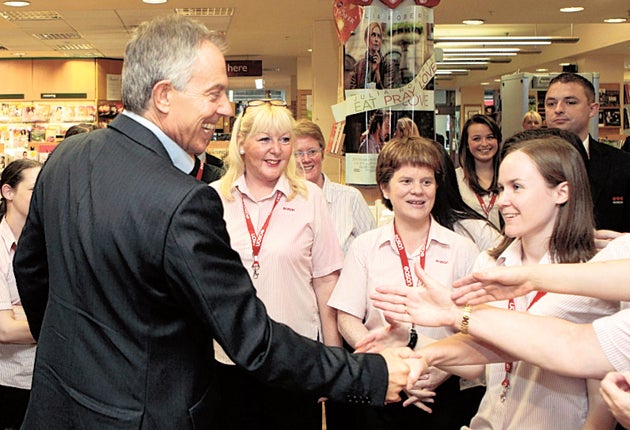Protesters force Tony Blair to call off book-launch party

Your support helps us to tell the story
From reproductive rights to climate change to Big Tech, The Independent is on the ground when the story is developing. Whether it's investigating the financials of Elon Musk's pro-Trump PAC or producing our latest documentary, 'The A Word', which shines a light on the American women fighting for reproductive rights, we know how important it is to parse out the facts from the messaging.
At such a critical moment in US history, we need reporters on the ground. Your donation allows us to keep sending journalists to speak to both sides of the story.
The Independent is trusted by Americans across the entire political spectrum. And unlike many other quality news outlets, we choose not to lock Americans out of our reporting and analysis with paywalls. We believe quality journalism should be available to everyone, paid for by those who can afford it.
Your support makes all the difference.Tony Blair decided to postpone a party to mark the launch of his memoirs in London last night to head off a protest by anti-war campaigners who threatened to disrupt it. The former prime minister, who had already scrapped a planned London book signing yesterday for the same reason, thought it would be best to push back the date of his party at Tate Modern.
Mr Blair said: "It is sad in a way because you should have the right to sign books or see your friends if you want to. But it was going to cause so much hassle. The people at the party are friends – and some of them are not political at all."
He told ITV's This Morning show: "I don't mind going through protesters – I have lived with that all my political life. But for other people it can be a bit unpleasant and frightening."
He said the party was intended to be a "thank you" to the people who had helped produce his memoirs, A Journey, in which he described his successor Gordon Brown as "maddening", "strange" and having "zero" emotional intelligence. Mr Blair said he and Mr Brown had not been in contact since the publication of the book, adding: "But we will."
Campaigners against the wars in Iraq and Afghanistan had planned to demonstrate outside the Tate Modern and criticised the gallery for allowing the party to be held there.
Lindsey German, the convenor of the Stop the War Coalition, said Mr Blair's decision was a "big victory" for the anti-war movement. She said: "It shows he is running scared. The people who say we should not protest are denying us the right to persist in asking questions about the war and denying the rights of Iraqis who are still suffering because of Blair's policies."
Eggs and shoes were hurled by protesters when Mr Blair signed copies of his book in Dublin at the weekend. One of them tried to make a citizen's arrest.
A Journey has soared to No 1 in the bestseller list in the UK and Ireland. The former prime minister, who feared his book would not sell when Lord Mandelson rushed out his autobiography in July, sold more than 92,000 copies in its first four days, against Lord Mandelson's 15,000 in its first few days. According to Neilsen BookScan, the Blair book enjoyed the highest opening-week sale for an autobiography since its records began in 1998.
Mr Blair's publisher Random House, which has already reprinted the book six times, said that when trade, paperback and Irish sales were taken into account, A Journey had sold more than 100,000 copies.
"It has been a phenomenal book for us – everyone has been talking about it and the proof is not in the protests but in the sales," said Waterstone's spokesman Jon Howells. "Overwhelmingly people have decided to make up their minds by reading the book, and we think sales will remain strong through to Christmas. There are few certain things in bookselling, but this is one – prime ministers' memoirs sell. One hopes David Cameron is keeping a diary."
John Major managed first-week sales of only 5,415; Cherie Blair 3,877; John Prescott 1,202 and David Blunkett 769. But Mr Blair has not matched Margaret Thatcher's performance. Her book The Downing Street Years, published before official sales records began, sold 120,000 copies in its first week.
Join our commenting forum
Join thought-provoking conversations, follow other Independent readers and see their replies
Comments